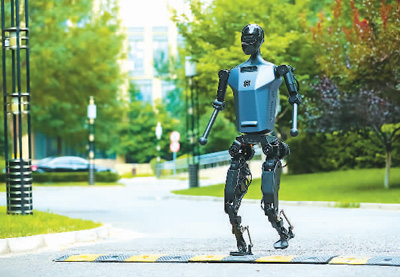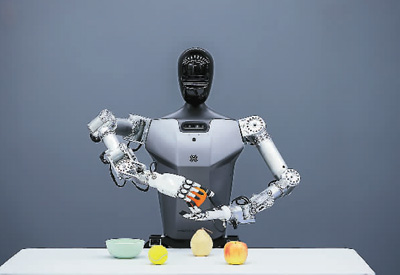Beijing E-Town vigorously promotes development of humanoid robot industry

Photo shows a humanoid robot taking selfies with visitors at the World Robot Conference 2023 in the Beijing Economic-Technological Development Area, or Beijing E-Town, in suburban Beijing. (File Photo)
In Hefei, east China’s Anhui Province, at the Chinese new energy vehicle company NIO’s Second Advanced Manufacturing Base, a 1.7-meter-tall robot steps towards the production line with small strides. Trained to perform tasks, it methodically completes quality inspections on door locks, taillight covers, and seat belts, finally affixing the car logo with delicate precision.
This marks the world’s first instance of a humanoid robot collaborating with humans on a car assembly line, performing both assembly and quality inspection. In the highly repetitive environment of an automotive production line, robots are introducing new possibilities.
A thousand kilometers away is the place making the greatest strides in humanoid robotics, the Beijing Economic-Technological Development Area, or Beijing E-Town, in suburban Beijing’s Yizhuang. It has emerged as an innovation hub for the humanoid robot industry, with the size of the sector accounting for over 50 percent of the capital city’s total.
Beijing E-Town has been strategically planning its humanoid robot industry since 2022, according to a staff member of its robot and intelligent manufacturing industry bureau. In a relatively short period of time, it has attracted over 100 companies related to humanoid robots.
The Zhongguancun (Yizhuang) International Robot Industrial Park, covering an area of 250,000 square meters, has become the center of their efforts. It is home to industrial giant UBTECH as well as Beijing Embodied Artificial Intelligence Robotics Innovation Center, or HUMANOID.
At HUMANOID, a humanoid robot called Tien Kung can follow the instructions of staff members. On April 27, 2024, the center revealed its independently developed general-purpose humanoid robot as a technological research platform.
When Tien Kung made its debut, it achieved the world’s first instance of an anthropomorphic full-size fully electric-driven intelligent robot running, as the robot sprinted onto the stage.
“This reflected the technological strength of our team,” said Li Chunzhi, deputy general manager of the center.
Measuring 1.63 meters in height and 56 kilograms in weight, Tien Kung showcases an impressive array of capabilities including climbing stairs and navigating obstacles. It has already demonstrated high-level embodied intelligence capabilities, including visual recognition, voice interaction, and unstructured object handling.
The center was established by industrial leaders like UBTECH, Beijing Jingcheng Machinery Electric Holding Co., Ltd. (Jingcheng Machinery Electric), and Beijing E-Town Robot Technology Industry Development Co., Ltd. in November 2023. It aims to build itself into a globally influential source of innovation in embodied artificial intelligence (Embodied AI) and a demonstration zone for Embodied AI.
The center has attracted top global scientists and engineers in embodied AI robotics, with research personnel accounting for over 70 percent of its total staff members. According to Li, three of the four heads of the center’s technical department are PhDs who returned from renowned overseas universities and have extensive experience in related fields.

Photo shows a humanoid robot called Tien Kung walking in the open air. (File photo)
UBTECH on its own has also developed a series of increasingly advanced humanoid robots since 2012. Its industrial humanoid robot Walker S, introduced in 2023, is the model working in NIO’s Hefei manufacturing plant.
The company’s dedication to innovation is evident in its impressive patent portfolio. By the end of 2023, UBTECH had secured over 2,100 patents related to robotics and artificial intelligence, including more than 400 overseas patents, over 50 percent of which were invention patents, according to Jiao Jichao, vice president of UBTECH. The company has more valid humanoid robot patents than anyone else in the world.
Although Beijing E-Town houses over 100 companies related to humanoid robots, it aims to attract more upstream and downstream enterprises in the sector.
Founded in 2015, Beijing Chietom Precision Transmission Technology Co., Ltd. (Chietom) is a company that specializes in developing and manufacturing rotate vector (RV) reducers, essential components applied in industrial robot joints. It has emerged as a leader in the field of high-precision transmission technology for robots.
Zhang Yueming, chief scientist of Chietom, said the company started research on reducers for humanoid robots in 2019. Zhang, also a renowned expert in robot reducers and a professor at Beijing University of Technology, led his team as they achieved scientific breakthroughs on the core technologies of RV reducers. Today, Chietom can produce 200,000 reducers annually, addressing a crucial technological bottleneck in the industry.

Photo shows a humanoid robot called Tien Kung identifying and grasping objects. (File photo)
The practical applications of humanoid robots are already being explored in various industries.
In early 2024, UBTECH’s industrial humanoid robots, Walker S, began “training” at the assembly workshop of NIO’s Second Advanced Manufacturing Base in Hefei. Subsequently, other automotive companies, including Dongfeng Liuzhou Motor Co., Ltd., FAW-VW Automotive Co. Ltd. Qingdao Branch, and Geely Auto, cooperated with UBTECH for the wide application of humanoid robots in industrial scenarios to build intelligent and flexible production lines and unmanned car factories.
According to Jiao, since the beginning of this year, the research and development (R&D) team at UBTECH has surveyed the needs of over 10 intelligent manufacturing enterprises in automobile, computer, communication and consumer electronic industries regarding robotic products.
He added that they have been involved in an in-depth discussion on the application of humanoid robots on auto production lines, mainly discussing the feasibility of applying humanoid robots in various aspects of auto manufacturing, including handling, sorting, assembling, and testing of auto parts.
Li suggested exploring the application scenarios of humanoid robots driven by demands in various industries. Li added that research institutions and robot-related enterprises can rely on the Tien Kung platform to explore applications of humanoid robots in intelligent manufacturing, hazardous operations, special work, business services, home care, and other areas according to market demands.c
Li noted that Beijing Embodied Artificial Intelligence Robotics Innovation Center has collaborated with the research center for intelligent robotics under the Tsinghua University Institute for Artificial Intelligence, the Lab for Affective and Cognitive Intelligent Robotics of Peking University, and the team of Guo Shijie, a professor from Hebei University of Technology for the development of humanoid robots.
In 2023, a three-year action plan was introduced to promote the high-quality development of the robot industry in Beijing E-Town. The plan set ambitious targets by 2025, including a compound annual growth rate of more than 50 percent in robot R&D investment, cultivating leading enterprises, setting up 50 demonstration projects for robot applications, achieving a robot density of 365 units per 10,000 workers in industrial enterprises above designated size, and making the robot industry achieve a total production value of 10 billion yuan ($1.4 billion).
Photos
Related Stories
- Chinese humanoid robots enter factory for on-site training
- Making the unreal real: Humanoid robotics lending hand to China's innovation-led drive
- Robotics technician: Emerging profession boosting efficiency of industries
- Chinese scientists develop humanoid robots with realistic facial expressions
- Cutting-edge technologies showcased in 8th China-South Asia Expo
Copyright © 2024 People's Daily Online. All Rights Reserved.









